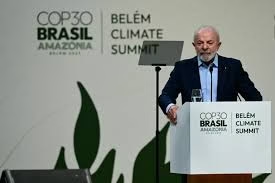Brazilian President Luiz Inácio Lula da Silva has warned that the planet can no longer sustain humanity’s dependence on fossil fuels, urging nations to accelerate the transition to cleaner energy or risk losing the global climate fight.
Speaking at a summit in the Brazilian Amazon, Lula emphasized that resolving the energy crisis would define “success or failure in the battle against climate change.” He stated that the Earth “can no longer sustain the development model based on the intensive use of fossil fuels that has prevailed over the past 200 years.”
The summit in Belém, which precedes next week’s COP30 UN Climate Conference, brought together world leaders and environmental officials calling for an end to coal, oil, and gas dependency—the main drivers of global warming.
Push for Energy Transition and Climate Action
Evidence of worsening climate impacts has become undeniable, with the last decade being the hottest on record, marked by more frequent heatwaves, hurricanes, and wildfires. Lula’s remarks follow a 2023 global pledge to “transition away from fossil fuels,” though progress remains slow.
Brazil is now advocating for a roadmap to phase out fossil fuels but has faced pushback from major oil-producing nations. Mexico’s Environment Secretary Alicia Barcena noted that setting a specific phase-out date is “problematic,” suggesting instead a long-term target.
Despite his strong rhetoric, Lula’s government recently approved new oil drilling in the Amazon, drawing criticism from climate activists.
Global Voices and the Call for Fair Contribution
Rwanda’s Environment Minister Bernadette Arakwiye highlighted the urgency of decisive action, stating, “We can continue with incremental progress while the planet burns, or we can rise to meet the scale of this crisis.”
Meanwhile, the absence of leaders from top-emitting countries—especially the United States, whose President Donald Trump has repeatedly dismissed climate science—cast a shadow over the talks.
Amid this backdrop, France, Spain, and Kenya have launched a push for a tax on luxury air travel, arguing that wealthier individuals should pay more due to their higher carbon footprints. “It is only fair that those who have more and pollute more should pay their fair share,” said Spanish Prime Minister Pedro Sánchez.
Climate Financing and Global Commitments
Although climate change has slipped down global priorities amid wars and economic strains, Brazil has gained international support for a new forest conservation fund, attracting over $5 billion in pledges to reward tropical countries for preserving forests that absorb carbon emissions.
Still, the world remains off track to meet the Paris Agreement’s 1.5°C warming limit, raising fears of worsening climate disasters.
Civil society groups, including Climate Action Network International, criticized wealthy nations for failing to honor their commitments to phase out fossil fuels and deliver sufficient climate finance to vulnerable communities.
UN Climate Chief Simon Stiell acknowledged the slow progress but noted that international cooperation since the 2015 Paris Agreement has reduced projected warming from 5°C to below 3°C. “It’s still perilous,” he said, “but proof that climate cooperation works.”



